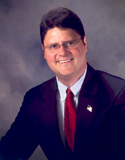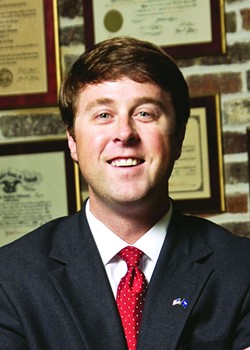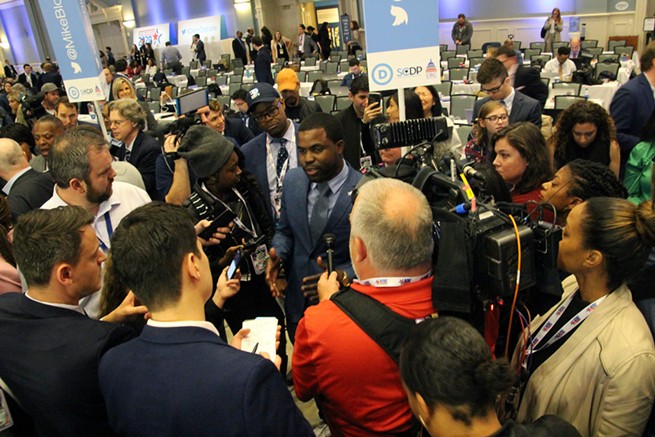INSIDE ISSUE 19.09 | Feb. 28, 2020
 BIG STORY: Lawmakers looking at effort to change U.S. Constitution
BIG STORY: Lawmakers looking at effort to change U.S. Constitution
NEWS BRIEFS: Clock ticks at Statehouse, 4K enrollment, more
COMMENTARY, Brack: Do something to reduce frenzy at presidential debates
SPOTLIGHT: S.C. Senate Democratic Caucus
FEEDBACK: Enjoyed “mute Lindsey Graham” article
MYSTERY PHOTO: Historic photo
Clock ticks at Statehouse, 4K enrollment, more

By Lindsay Street, Statehouse correspondent | The clock is ticking down: There are three legislative days left in the House before the start of budget deliberations and six legislative days left in the Senate before Santee Cooper deliberations.
The session is expected to end May 14.
Ahead in the House
House floor deliberations on the state budget begin March 9 and are expected to be done by the end of the week. The following week is a furlough week for House members. And then they are expected to debate the future of Santee Cooper — something that could eat up a lot of floor time that remains for the session.

House Majority Leader Gary Simrill of Rock Hill said members are focused on “working the calendar at this point.” This week, the House passed several education-focused bills, including limiting lunch debt collections, and a bill seeking to streamline local governments’ business license fees.
And floor time in the House will continue to be limited through the next three legislative days to allow the Santee Cooper Ad Hoc committee to continue to meet and work toward making a recommendation to the House by March 12.
Lancaster Democratic Rep. Mandy Powers Norrell said all eyes are on the budget and Santee Cooper in the House.
“There’s a sense among legislators if we haven’t gotten our bill out of the chamber by now we’re going to have to wait and reintroduce it next session,” she said.
Gilda Cobb Hunter, D-Orangeburg, said she is sponsoring a bill at the top of the contested calendar for second reading that she would like to see heard on the House floor: It would require the state inform people who are released from prison of their right to register to vote.
Ahead in the Senate
Senators voted 25-17 this week to limit debate on an education bill that has sapped energy and time for most of the year, so far. But don’t get too excited, some say, because the debate isn’t over yet and, if it wraps up before the chamber deals with Santee Cooper, senators may spend several legislative days dealing with its backlog of uncontested bills.

“This bill that was bad from the beginning is still a very bad bill and the Senate has decided that bad bill or not, we are going to get this thing through,” Great Falls Democratic Sen. Mike Fanning said. He has pulled most of his amendments but said he plans to “fight until the very end.”
The cloture on debate does not limit third-reading amendments in the Senate.
Fanning said he thinks Republicans in the Senate have another motive to limit begin ending debate on education: voting on a bill that would end nearly all abortions in the state ahead of the March 16 deadline for candidates to file in party primaries.
“That is the million-dollar story that no one is telling right now. If we are moving past this bill to start moving down the calendar, there are some good bills to work on but that ain’t the reason,” Fanning said. “If we thought this was a bottleneck, wait until we get to abortion … This is the dirty side of politics that I never dreamed I’d have to face at the state level.”
Senate Majority Leader Shane Massey of Edgefield said there’s little chance the Senate will actually take up the “Fetal Heartbeat Abortion Act,” House Bill 3020. Since the beginning of session, he has publicly doubted Republicans had enough votes to put it to the top of the Senate’s agenda.
“We haven’t really had a conversation about what’s next as far as the next contentious items,” he said. “When we get done with education, we are going to have to have a conversation about what we are doing next. The focus so far has been to try to end education debate.”
Massey said he expects the Senate to deal with about 50 uncontested bills on the calendar before dealing with the future of Santee Cooper and then the budget.
In other news:
Democratic primary set for Saturday. The S.C. Democratic Presidential Preference Primary is Feb. 29. Polls are open from 7 a.m. to 7 p.m. If you have questions on voting, click here.

Trump taps House Judiciary chair McCoy. The White House announced this week that Charleston Republican Rep. Peter McCoy has been nominated by President Donald Trump to serve as U.S. Attorney for the District of South Carolina. The appointment is pending confirmation in the U.S. Senate. Read more. In other House Judiciary news, the committee received favorable reports on a Senate-passed bill, S. 176, to reinstate the electric chair for executions and on a bill that seeks to curb teen vaping, H. 4710. Previous coverage of vaping and state lawmakers.
4K program covered 70 percent of impoverished students in 2019-2020. About 70 percent of South Carolina’s low-income 4-year olds, or 25,366 children, were enrolled in the state’s public education in 2018-2019, according to a new report from the state’s Education Oversight Committee. Read more about this finding and more here.
- Previous opinion: South Carolina needs to expand access to 4K education.
House leader says anti-offshore drilling bill ‘will pass.’ Simrill said a House bill that would effectively bar offshore drilling and its infrastructure in South Carolina “will pass in the House but it will happen after the budget.” Read previous coverage on this session’s off-shore drilling legislation.
Lawmakers to screen MUSC, USC, S.C. State trustee candidates. Senate and House members will screen candidates seeking to serve on the boards for the Medical University of South Carolina, South Carolina State University and the University of South Carolina beginning noon March 2 in room 209 of the Gressette building at the Statehouse grounds in Columbia. See the agenda here.
Senators to hear from DHEC on coronavirus. The Senate Medical Affairs Committee will hear from the S.C. Department of Health and Environmental Control regarding the coronavirus in a meeting starting 10 a.m. March 5 in room 308 of the Gressette building on the Statehouse grounds in Columbia. See the agenda here.
Deaf, blind students to perform at Statehouse March 4. Fine arts students from the S.C. School for the Deaf and the Blind will perform two songs before the SC House of Representatives on March 4. The students will perform “Stand by Me” and “I Love South Carolina,” an original song by the students and singer/songwriter Ellis Paul. More info.
- Have a comment? Send to: feedback@statehousereport.com
Do something to reduce frenzy at presidential debates

By Andy Brack, editor and publisher | Halfway through the nationally-aired South Carolina presidential debate on Feb. 25, the television got turned off. Too much bickering. Too little substance. Too much crosstalk.
 There’s got to be a better way for voters to get information than big spectacles where candidates have 75 seconds to answer direct questions and challengers can pipe in for only a few seconds. More serious discussion is needed.
There’s got to be a better way for voters to get information than big spectacles where candidates have 75 seconds to answer direct questions and challengers can pipe in for only a few seconds. More serious discussion is needed.
From a production standpoint, CBS did a beautiful job in transforming the Charleston Gaillard Center into a red-white-and-blue presence that looked great and felt right. But what went wrong during South Carolina’s moment in the spotlight was the format and how moderators didn’t moderate. A few observations:
Microphones have off buttons. During particularly frenzied or tense moments during the two-hour debate, candidates started interrupting and yelling to get words in edgewise, which led mostly to chaos. At one point, former Vice President Joe Biden questioned whether rules would be enforced, asking, “Can we just speak up when we want to?”
At that moment moderators Norah O’Donnell and Gayle King should have stopped the debate, turned off the microphones and warned candidates that only one microphone “hot” or on at a time if the crosstalk continued. (That’s the magic of electronic media — microphones can be turned off.) Candidates would have settled down and a sense of decorum would have returned.
Better moderators. The moderators just didn’t control the debate. They seemed to be out of their element, letting candidates run the show, which is why it often seemed like organized chaos. In the future, perhaps professional, trained moderators who know how to run debates, not television anchors, should be in charge. It also wouldn’t have hurt if a local reporter or two had been part of the panel of questioners.
Better questions. The Charleston debate was for a national audience, especially since the Feb. 29 primary is to be followed March 3 by Super Tuesday voting in 14 states. In Charleston, where a mayor’s race hyper-focused in November on flooding and climate change, it was telling there were no questions about either — in a campaign where climate is getting more and more attention.
So what’s an alternative to the debate nonsense? How about this: Instead of a fancy show that costs lots of money, how about giving a few minutes of unrestricted television time to candidates to share whatever they want in prime time, followed by live or videotaped short answers to three or four questions from the national and local media?
If, for example, each early voting state had a debate in this format, each candidate could address the national audience on big issues in a 5-minute statement, which would be a short version of a stump speech. Then the forum host could have reporters ask short regionally- or locally-focused questions for candidates to give 1-minute answers.
Such a format would keep the broadcast from going on forever and it could be paid for with commercial breaks. Had each candidate in Charleston been handled without the big debate spectacle through this proposed format, the whole prime-time show would have lasted 70 minutes, not two hours. Furthermore, the broadcaster could have still had a big “spin room” where candidates, surrogates and staff were interviewed after statements and answers to give context to what people heard.
Such a new, engaged format would, in and of itself, encourage participants to pay attention to issues and discourage cacophonic attacks on other candidates. Moderators wouldn’t really have anything to moderate and would, instead, be able to focus on asking questions of candidates to extract answers that shine lights on more issues. And voters might learn more in one sitting about a variety of candidates than they could in spending hours doing online research or going to rallies.
It’s hard enough to figure out which candidate might be best for the country without having to sift through noise, crosstalk and too much yelling. Political parties and candidates need a better way to engage voters in prime time. Some free TV time mixed with answers to probing questions might be just the ticket. Doing things the same way in the future is going to lead to more disasters.
- Have a comment? Send to: feedback@statehousereport.com.
S.C. Senate Democratic Caucus
 The public spiritedness of our underwriters allows us to bring Statehouse Report to you at no cost. This week’s spotlighted underwriter is the S.C. Senate Democratic Caucus. Organized almost 25 years ago, the Caucus has played an important role in many of the historic issues facing our state. As a vibrant minority party in the Senate, its role is to represent our constituents and present viable alternatives on critical issues. The S.C. Senate Democratic Caucus remains a unique place for this to occur in our policy process.
The public spiritedness of our underwriters allows us to bring Statehouse Report to you at no cost. This week’s spotlighted underwriter is the S.C. Senate Democratic Caucus. Organized almost 25 years ago, the Caucus has played an important role in many of the historic issues facing our state. As a vibrant minority party in the Senate, its role is to represent our constituents and present viable alternatives on critical issues. The S.C. Senate Democratic Caucus remains a unique place for this to occur in our policy process.
- Learn more about the Caucus at: www.scsenatedems.org.
Enjoyed “mute Lindsey Graham” article
![]() To the editor:
To the editor:
Thanks for the “mute Lindsey Graham” article. I use the mute button anytime I see that he is on TV.
Agree that he appears to be the worst kind of opportunist swimming around the “big shark” hoping to draft some power. His total abandonment of Senator [John] McCain was a wake up call and I no longer give Lindsay the benefit of a doubt concerning motives. I hope Jamie Harrison is able to permanently mute Mr. Graham.
— Carolyn Jones, Columbia, S.C.
Use mute button on yourself
To the editor:
[President Bill Clinton] committed a crime. [President Donald] Trump didn’t—dah!
Try the mute button itself please
— Fred McGuire, Ninety Six, S.C.
Make our day: Send us a letter or comment
We love hearing from our readers and encourage you to share your opinions. But you’ve got to provide us with contact information so we can verify your letters. Letters to the editor are published weekly. We reserve the right to edit for length and clarity. Comments are limited to 250 words or less. Please include your name and contact information.
- Send your letters or comments to: feedback@statehousereport.com
Historic photo

Here’s a photo that’s more than 150 years old. It’s related to South Carolina, but can you guess what it is? Send your best guess to feedback@statehousereport.com. And don’t forget to include your name and the town in which you live.
Our previous Mystery Photo
 Our Feb. 21 image, “Water tower,” should have looked familiar to anyone who may have visited Fripp Island in Beaufort County. The iconic water tower, one person observed, looks like a golf ball on a tee.
Our Feb. 21 image, “Water tower,” should have looked familiar to anyone who may have visited Fripp Island in Beaufort County. The iconic water tower, one person observed, looks like a golf ball on a tee.
Congratulations to those who recognized the tower: George Graf of Palmyra, Va.; Philip Cromer of Beaufort; Will Bradley of Las Vegas, Nevada; Boyd Brown of Ridgeway; Jay Altman of Columbia; Henry Eldridge of Tega Cay; and Frank Bouknight of Summerville. Good sleuthing!
Graf added, “According to Wikipedia, “although it has had several names over its history, the island is presently named after Captain Johannes Fripp, a British sailor charged with protecting the Carolina colony from Spanish attacks. Local folklore history has long suspected Fripp to be the location where Edward Teach, the pirate known as Blackbeard, had stowed away some of his treasures.”
- Send us a mystery: If you have a photo that you believe will stump readers, send it along (but make sure to tell us what it is because it may stump us too!) Send to: feedback@statehousereport.com and mark it as a photo submission. Thanks.
ABOUT STATEHOUSE REPORT
Statehouse Report, founded in 2001 as a weekly legislative forecast that informs readers about what is going to happen in South Carolina politics and policy, is provided to you at no charge every Friday.
Meet our team
- Editor and publisher: Andy Brack, 843.670.3996
- Statehouse correspondent: Lindsay Street
 Buy the book
Buy the book
Now you can get a copy of editor and publisher Andy Brack’s We Can Do Better, South Carolina! ($14.99) as a paperback or as a Kindle book ($7.99). . The book of essays offers incisive commentaries by editor and publisher Andy Brack on the American South, the common good, vexing problems for the Palmetto State and interesting South Carolina leaders.
More
- Mailing address: Send inquiries by mail to: 1316 Rutledge Ave., Charleston, SC 29403
- Subscriptions are free: Click to subscribe.
- We hope you’ll keep receiving the great news and information from Statehouse Report, but if you need to unsubscribe, go to the bottom of the weekly email issue and follow the instructions.
- © 2020, Statehouse Report, a publication of City Paper Publishing, LLC. All rights reserved.
- Read our sister publications: Charleston City Paper (every Wednesday) | Charleston Currents (every Monday)


